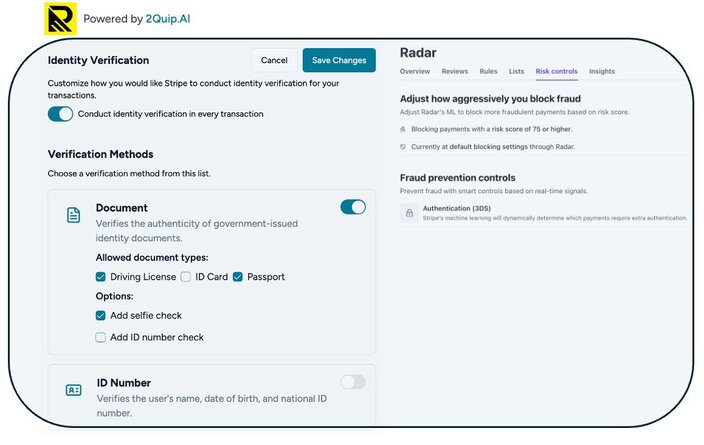2Quip AI Reduces Equipment Rental Fraud
July 13, 2025

Safeguarding the Equipment Rental Industry: Preventing Fraud and Theft from the Ground Up
In the fast-paced world of equipment rental, where heavy machinery, tools, and vehicles change hands daily, fraud and theft pose significant threats to profitability and operational stability. The industry, valued at over $80 billion in revenue projections for 2025, relies on trust between renters and providers. However, with rising incidents of stolen equipment and fraudulent transactions, businesses must adopt robust preventive measures. While GPS trackers have long been touted as a key tool for recovery after theft, a more proactive approach—starting with rigorous ID verification and leveraging advanced payment fraud detection systems like Stripe's Radar—offers superior protection by stopping issues before they escalate.
The Scale of the Problem: Theft and Fraud Statistics
Theft in the equipment rental sector is a persistent and costly issue. According to recent reports, equipment theft drains approximately $100 million annually from the industry, with more than 360 pieces of machinery disappearing each month.ktla.com This figure underscores the vulnerability of rental stores and job sites, where thieves target high-value items like excavators, generators, and loaders. Dealer and rental locations are the most common targets, followed closely by active job sites, as highlighted in security trend analyses.ner.net
Fraud compounds these losses, often manifesting as identity theft or unauthorized rentals using stolen credentials. Fraudsters may rent equipment under false pretenses, never intending to return it, leading to vanishing tools and heavy machinery. Industry experts note that rental fraud is on the rise, with many incidents going unreported due to the difficulty in tracing perpetrators.patronscan.com These challenges not only result in direct financial hits—ranging from $15,000 to $50,000 per incident, excluding lost business and insurance hikes—but also erode customer confidence and increase downtime.
The Role of GPS Trackers in Theft Prevention
GPS trackers have become a staple in the fight against equipment theft. Installed on rental assets, these devices provide real-time location data, enabling quick recovery if theft occurs. For instance, if a piece of machinery is moved outside a designated geofence, alerts can notify owners immediately, potentially thwarting thieves before they escape. Industry reports indicate that GPS technology has helped recover stolen equipment in numerous cases, reducing overall losses by allowing law enforcement to act swiftly.
However, while GPS trackers are valuable for post-theft response, they are inherently reactive. They address the symptom—recovery—rather than the root cause: allowing fraudulent renters access in the first place. Thieves can tamper with or disable trackers, and recovery efforts still incur costs in time, legal fees, and potential damage. In an era where prevention is key to minimizing risks, relying solely on GPS leaves businesses exposed during the critical initial rental phase.
A Better Approach: Starting with ID Verification and Payment Fraud Detection
he most effective strategy to combat fraud and theft begins at the rental process's inception. By implementing stringent ID verification, rental companies can confirm the legitimacy of customers before any equipment leaves the premises. Modern ID verification technologies, such as biometric scans or digital document checks, cross-reference provided information against databases to detect fakes or inconsistencies. This proactive step has proven highly effective; for example, biometric ID verification can reduce rental application fraud by up to 95%.leasey.ai By weeding out bad actors early, businesses prevent theft altogether, avoiding the need for costly recovery operations.
Complementing ID checks, integrating payment fraud detection algorithms further fortifies the process. Platforms like Stripe offer Radar, a machine learning-powered tool that analyzes card usage patterns, transaction behaviors, and risk indicators in real time. Radar can flag suspicious activities—such as unusual spending patterns or mismatched billing details—before approving payments. For rental businesses, this means detecting potential fraud during the booking or payment stage, where anomalies like high-value rentals from new accounts or irregular geographic patterns can be scrutinized.stripe.com Stripe's system not only blocks fraudulent transactions but also adapts to evolving threats, providing an additional layer of security without disrupting legitimate customers.
Together, ID verification and Stripe's fraud protection create a comprehensive barrier. They shift the focus from recovery to prevention, reducing incidents of non-returned equipment and unauthorized use. This approach aligns with broader industry trends toward digital safeguards, where early intervention minimizes losses and streamlines operations.
Conclusion: Proactive Measures for a Secure Future
Preventing fraud and theft in the equipment rental industry is essential for sustaining growth and trust. While GPS trackers play a supportive role in asset recovery, the superior method lies in addressing vulnerabilities at the start: through robust ID verification and sophisticated payment analysis via tools like Stripe Radar. By using 2QuipAI’s equipment rental platform with Biometrics ID Verification and Stripe’s Radar Algorithms, a rental business can protect its assets, lower insurance premiums, and foster a safer ecosystem. As the industry evolves, prioritizing prevention over reaction will be the key to long-term success.
To support these insights, key industry data sources include the National Equipment Register (NER) reports on theft trends and statistics from PatronScan on the efficacy of ID verification in reducing fraud.landairsea.compatronscan.com These resources highlight the urgent need for upfront safeguards in an increasingly digital rental landscape.